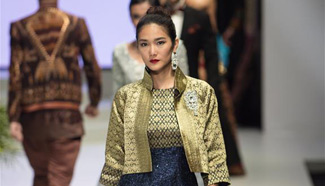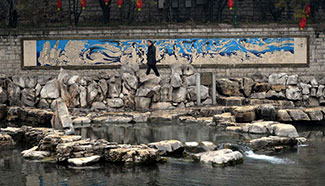by Zheng Jiangua, Grandesso Federico
BRUSSELS, March 9 (Xinhua) -- China and the European Union (EU) could team up to champion the multipolar international system as President Donald Trump, who clings to the "America First" mantra on the campaign trail, took up the reins of leadership in the Unites States, experts have said.
"Traditionally for China, the main focus of its foreign policy has been the United States, but the election of Trump has obviously changed the situation a little bit," said Duncan Freeman, a research fellow at the College of Europe in Bruges, Belgium.
"It is clear that although the United States will continue to be a primary focus of China's foreign policy, Europe has become more important than it was before," he said, elaborating that the change resulted more from globalization in such areas as climate change and trade, than the evolution of EU-China or U.S.-China relations.
Freeman noted that the United States under the Trump administration is apparently threatening to withdraw from, if not undermining, multilateral cooperation, a move that puts it at odds with both China and the EU.
"The United States has been one of the founding fathers of the system and one of the primary beneficiaries of it, but now Americans are saying they are losers of the system and want to withdraw," Freeman said.
"China believes that although there are problems with the system, it should be sustained." he said.
"The EU also believes in a multilateral global system. It believes that the World Trade Organization (WTO) is important and that agreements like the one reached in Paris are fundamental."
"I don't think China and the EU share completely the same stand, but there are potential grounds for agreements between them," he added.
Freeman's remarks struck a chord with Chinese Foreign Minister Wang Yi, who said China values Europe's strategic position and important role.
"We would like to work with Europe to respect and address each other's legitimate concerns and remove obstacles to cooperation... to practice multi-lateralism and make the world a multipolar place," Wang told a press conference on the sidelines of the annual legislative session in Beijing on Wednesday.
"We would like to work with Europe to re-energize the world economy, improve global governance and ensure a healthy development of economic globalization," he said.
In an annual trade policy agenda document released on March 1, the Office of the U.S. Trade Representative said that the Trump administration might defy WTO rulings that it views as interfering with U.S. sovereignty.
The document is in line with Trump's "American First" doctrine. After taking office, Trump has vowed to adopt tough measures against those countries that have large trade surpluses with the United States.
"In the WTO, if you have one of the major parties like the United States saying that it is not going to respect decisions taken against it, then the system collapses," Freeman warned.
"Potentially the two biggest drivers are China and the EU," he said, adding that whether China could fulfill that role hinges on what China will do at the international level to maintain the WTO system and how it is going to work at the domestic level.
"This year we will probably see potential changes like domestic reforms and opening up of the economy in terms of trade and investment," said Freeman.
Echoing Freeman, Fraser Cameron, director of Brussels-based think tank The EU-Asia Center, told Xinhua that China and the EU are seeking to cement bilateral ties, underlining that several high-level meetings are in the offing, including the EU-China summit and a security dialogue in April which EU foreign policy chief Fedeica Mogherini would probably attend.
Fraser stressed that the most important thing for the EU and China to do is to complete the Bilateral Investment Treaty (BIT) negotiations as soon as possible.
Regarding the potential for security cooperation, he said the key is to have an exchange of views on regional hotspots like the Middle East, parts of Africa and the South China Sea, and to try to understand the source of differences.


















